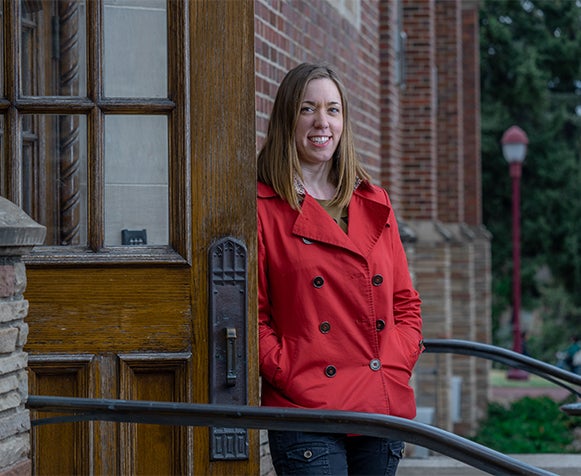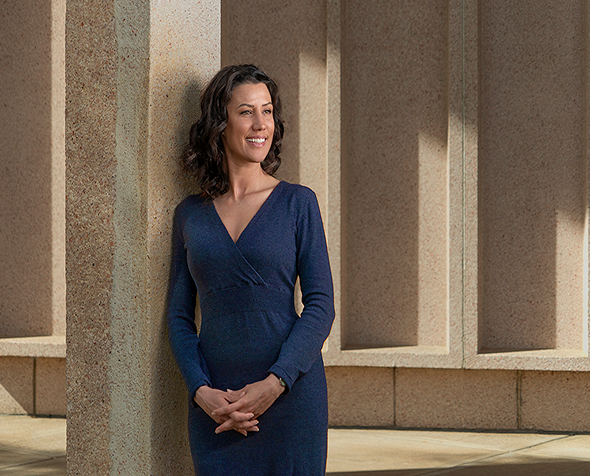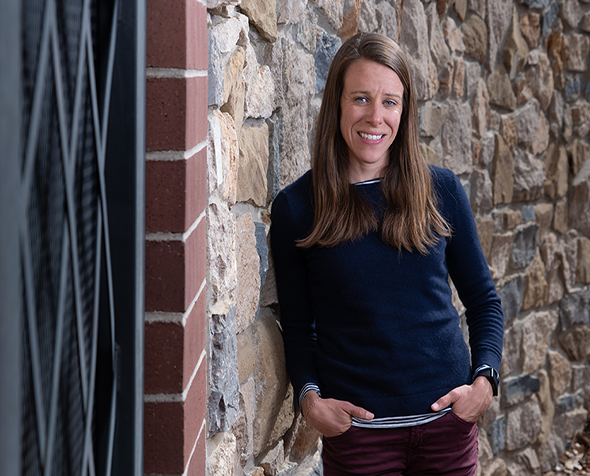Doctoral Student’s Research Addresses an Overlooked Population
Molly Sarubbi explores challenges facing foster system alumni in higher education

For much of her childhood and adolescence, Molly Sarubbi would have been deemed an unlikely candidate for a bachelor’s degree, much less the PhD she will claim at the University of Denver’s Commencement ceremony in June.
That’s not because she was an indifferent student. To the contrary, she excelled in school. But good grades and her impressive performance were, statistically speaking, unlikely to overrule one striking biographical fact.
“I grew up in and out of foster care,” Sarubbi says. And that experience typically precludes postsecondary success. In fact, not even 3% of the foster kids who graduate high school enroll in college. And from there, the data trackers lose them. How many finish college? How many go on to graduate school. There’s no telling.
Sarubbi hopes to raise the visibility of this resilient group. A student of higher education leadership at the Morgridge College of Education, she has focused her dissertation on degree attainment among the 3% of foster-system veterans who get into college.
Sarubbi has made their challenges part of her job as well: As a project manager and policy researcher at the Denver-based Education Commission of the States, she closely follows foster-system issues and how they are addressed in education policy. In the years to come, whether she works for a nonprofit, a government agency or a university, Sarubbi plans to keep her eye on the education prospects for foster kids.
“The topic is super near and dear to my heart, and I really try to touch it from all [directions]: advocacy, policy, education,” Sarubbi says. “There hasn’t been a whole lot of research around this population and their [academic] success. My dissertation specifically looks at the tools that helped the low percentage that do succeed.”
Why are enrollment and persistence so problematic? For starters, foster students often move from home to home and school to school, which isn’t conducive to pursuing things like application-enhancing AP classes and extracurricular activities. The simple act of dispatching a high school transcript to colleges is pretty daunting if you’ve attended four or five schools in a handful of years.
But that’s nothing compared to filling out the Free Application for Federal Student Aid (FAFSA) when a parent’s financial information and tax returns simply are not available. And it's nothing compared to determining — without benefit of parental advice — the best strategies for applying: early decision and early action vs. regular admissions?
Once foster alumni get to college, the challenges remain. “This traumatic life that they may have had doesn’t end because now they are a freshman at DU,” Sarubbi explains, citing the experiences of some of the young men and women she met while completing her dissertation. That project draws on the accounts of numerous students who found even their first days on a college campus to be alienating and baffling.
Consider the student, fairly typical, whose personal possessions did not include so much as a suitcase. “‘I showed up with a garbage bag with like three things in it. And went in to check into family orientation — alone,’” Sarubbi says, paraphrasing one would-be undergraduate’s story about day one of college life. That same student might have been delighted to have a roof over her head for the fall months, but then, with the residence halls closed for the holidays and with no family to visit, homelessness and hunger seemed like a real possibility.
In collecting and examining these experiences, Sarubbi adopted unusual methodology. She not only surveyed and interviewed foster system veterans with college classes to their credit, she enlisted them in the analysis of the data and the formation of conclusions.
“I didn’t go in, interview people and take their stories and make my own conclusions — which is traditionally what academic research has done. We co-constructed the knowledge together,” she says. “Historically, I think a lot of research has been on the backs of populations that we want to learn about. And my [research] really centered the participants as the knowledge creators. I don’t own the research. Granted, it’s my dissertation and my degree. That’s just how the academic system is set up. But they were involved with analysis; they helped write some of it. … All the recommendations and findings are really developed as a result of the participants’ voices and stories.”
As the professor who advised Sarubbi on her dissertation, Judy Kiyama, chair of the Morgridge College's higher education department, credits Sarubbi not only with using groundbreaking methodology — “it’s called participatory action research,” she explains — but with using it in an innovative way.
To enlist participants in the project, Sarubbi had to ensure they were using appropriate practices. “She couldn’t make the assumption that they all had research training, so she had to set up a training course for them to learn about doing research,” Kiyama says. And in her dissertation itself, Sarubbi breaks from convention by using the first chapter not to define the problem or challenge at hand but to introduce the study's participants and let them share their definitions of education success.
“Molly’s project not only pushes us in terms of methodology, but she’s pushing us to rethink how we share dissertation work,” Kiyama says.
Sarubbi’s own story of growing up in Rochester, New York, also informed her approach to her research. She entered foster care at age 5 and lived within the system until just before she graduated from high school.
“Attending multiple K-12 schools was really difficult,” she recalls. “[But] for me, school was always kind of my thing. I could thrive there; I could try hard, and teachers would recognize that I was a smart student. It was a safe haven. Even if I moved around schools, what I learned in a classroom I could take with me.”
But some of the experience remains foggy in her memory. Who attended parent-teacher conferences to get the scoop on her progress? Sarubbi doesn’t know. Perhaps no one. Who was on duty to make sure she took the PSAT and the right college-entrance exams? That was pretty much left up to her, and she’s not sure how she pieced all the parts together.
“I don’t remember anyone saying, ‘You have to go to college.’ Nobody in my family went to college. None of my friends. I didn’t know anybody who went to college. Certainly when I was in care, nobody was talking about college,” she says.
And certainly no one was talking about how she should have a list of schools with a range of "stretch" and "safety" options. She didn’t understand that she had choices, that many colleges would find her a promising candidate for admission. So she pursued a bachelor’s degree at the institution she knew best: Nazareth College, where she studied psychology. “I honestly applied to the school that was down the road from where I worked,” she says. “I had passed it on the bus. I knew that school, and I thought the campus was pretty.”
When it came time to pursue graduate studies, she enrolled at the University of Rochester. There, she began studying with Kiyama, who relocated to DU in 2013. Although Sarubbi had rarely left the Empire State, she decided to move to Denver as well, so she could continue her work under Kiyama. That meant a new life in a state she had never even considered visiting. “I had never imagined leaving Rochester,” she says. “I literally didn’t know anybody west of Pennsylvania. When you have a small reality, you only know what you know.”
Looking back on her graduate work, Sarubbi is struck by the resilience and courage that foster-system alumni demonstrate in the face of so many obstacles.
“They are hell-bent on landing on their feet,” she says.
She, meanwhile, is determined to help them do so, in part by providing the research and insights that will spur positive change within education systems. After all, Sarubbi says, “I don’t like the status quo.”










